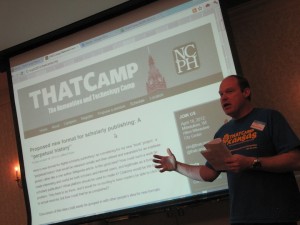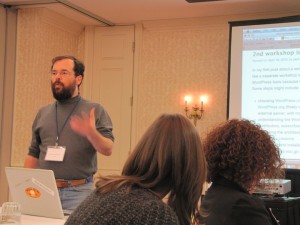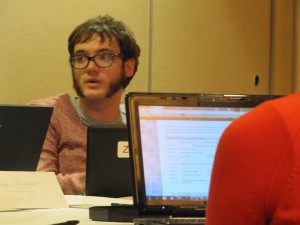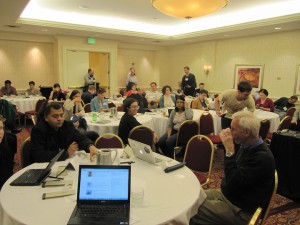Return of THATCamp NCPH
19 April 2012 – Cathy Stanton
The “unconference” movement is barely a decade old (Tom Scheinfeldt noted in our capstone session that the first one he attended was in Silicon Valley in 2004) but it’s clear that for many people–perhaps particularly for public historians–it offers a welcome alternative to more formal conference formats. Today’s THATCamp NCPH, the second digital humanities unconference held at an NCPH conference, was “orderly but spontaneous and inspiring” in the words of one participant when we gathered to debrief at the end of the day. “I appreciated the way people just plunged in.”
Plunging in was a recurring theme in the debrief discussion. Scheinfeldt noted that people often come to THATCamps looking for answers, but one of the most important pieces of learning that we come away with is that, “We’re all just throwing things against the wall and seeing what sticks. And that’s the way we should do digital work.” Several people noted that they were leaving with “to do” lists or new digital links to follow up on. Thanks to Jack Dougherty’s one-hour intro to WordPress, a number of participants dipped their toes the blogging world for the first time (Dougherty also covered various other digital tools in a second “Ten-Minute Tutorials” session.)
Some people came away knowing how to integrate QR codes into exhibitry or thinking about ways to integrate a WordPress site into a thesis project. One camper announced proudly that she had learned how to get rid of all the Viagra ads from her website! We spent our share of time thinking about philosophical and structural issues relating to digital history, but the push was continually in the direction of doing something as well as talking about. As Trevor Owens said at one point, “Don’t talk about it anymore. Just go and put five things on HistoryPin and see what it looks like. All these things are just a way to instantiate a first draft of something.” From there, he said, we can begin to envision what the next steps might be. And not all of those steps have to be linear or sure-footed; one insight from the session on digital history pedagogy was that teachers could work to instill a “pedagogy of frustration” in their students as a way to emphasize the importance of experimenting and working through apparent failures. In that sense, the mindset of digital history is as akin to that of the engineer as that of the academic.
Joan Troyano from the Roy Rosenzweig Center for History and New Media (which co-sponsored and helped to facilitate the event) thought that this year’s NCPH camp had included more talk about digital publishing and scholarship than last year’s gathering, but she also felt that there had been less talk about the essential differences between print and online materials. Arguing that we’re in a potentially creative moment when the forms of digital scholarship have yet to be nailed down and codified as fully print scholarship has been, she urged us to think about what the unique aspects of online media might be.
“History@Work” coalesced as a result of a discussion at last year’s THATCamp NCPH, and it was great to sit down with our editorial team after the camp and work on some issues for our post-beta phase, which should be coming along very soon. I’m hoping that down the road, when we’ve got a bit more authorial and organizational infrastructure in place, the blog can begin to be a vehicle for more experimentation in digital public history scholarship. One of the ways that online media fundamentally differ from more conventional forms, I think, is that it’s easier to do things gradually, and to make room for trial and error. Today’s camp experience reinforced for me that this isn’t just a strategy born of necessity, but an intentional embrace of an approach that continues to lead us in productive directions.
~ Cathy Stanton








1 comment